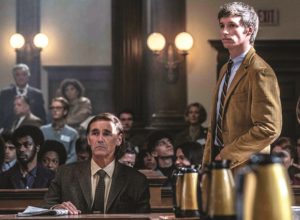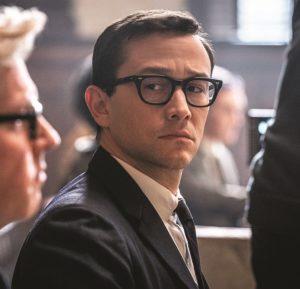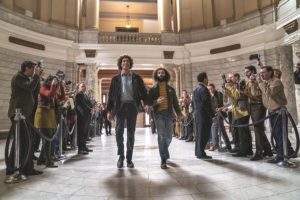It might have been called Vietnam, Mon Amour. Those of us who lived through the Vietnam War era and its political upheaval — government lies and repression, youth rebellion and counterculture — might view what’s happening during Trump’s trashing of America and not make a connection to a movie about the ’60s. Yet it’s inevitable that history repeats itself, and, in ways both subtle and obvious, it has. Watching Aaron Sorkin’s brilliantly distilled dramatization of The Trial of the Chicago 7 (now streaming exclusively on Netflix), a federal prosecution of protest leaders at the Democratic National Convention in Chicago in 1968, will be a different experience for those who were not yet born when it takes place. But for viewers of all stripes, it’s bound to captivate.

The opening, which sets the scene with images of the war, vintage television coverage, and the antiwar and civil rights movements, is almost a quaint newsreel. Yet it has to be there, because the historical context is essential. We have come so far from Vietnam: our media landscape has become more complex, fragmented, and degraded without a standard bearer such as Walter Cronkite; divisiveness is no longer hinged on the younger (draft-able) and older generations; and the “revolution” promised by Bernie Sanders and Alexandria Ocasio-Cortez are policies that would have been considered moderate or even Nixonian in 1968.
But some things are familiar. Bobby Seale (Yahya Abdul-Mateen II), the Black Panther who had little to do with the rioting that led to the trial, is treated unconscionably by Judge Julius Hoffman (Frank Langella), the federal judge whose racism and obduracy helped fuel the media circus. (The trial was actually of the Chicago Eight until Seale, bound and gagged for demanding his choice of legal representation, forced a mistrial that separated him from his white co-defendants.) Black Panther Fred Hampton was executed by the Chicago police during the trial, and the echoes of Black Lives Matter are chilling.
The racism, however, is merely a sideshow. The defendants were accused of inciting riots, when, in fact, as anyone who watched the violence on television could see, the Chicago police were largely responsible for what happened. Tom Hayden (Eddie Redmayne) and Rennie Davis (Alex Sharp), the leaders of the antiwar protestors, were unarmed and not seeking a violent confrontation. The Yippies, led by Abbie Hoffman (Sacha Baron Cohen) and Jerry Rubin (Jeremy Strong), were primarily interested in the theatrical spectacle of subversion; they, too, were not expecting to get clubbed.

What becomes apparent, mostly through the eyes of Assistant U.S. Attorney Richard Schultz (Joseph Gordon-Levitt) and defense attorney William Kunstler (Mark Rylance), is that the trial is a political whitewash: an attempt to prove that the rioters were somehow guilty of their own bashing. Doesn’t that sound Trumpian?
Aaron Sorkin develops all these characters with surgical precision, as is his wont (A Few Good Men and The Social Network on film; The West Wing and The Newsroom on television). Here, reportedly on the insistence of Netflix, he directs, as well. The rat-a-tat dialogue he is known for is less ostentatious in Chicago 7: he seems more intent on making history ring true, so each actor speaks at his own pace. (There are few “hers” — it’s mostly an all-male affair.)
Some of the performances are outstanding. Cohen, as the mischievous Abbie Hoffman, is pitch-perfect, and a climactic scene he plays on the witness stand is award-worthy. Redmayne, as Hayden, the future politician, is marvelously calculating and conflicted. Rylance, as the stressed but sharp lawyer Kunstler, makes more of sad and weary looks than all those shouting and gesticulating around him. How remarkable that all three (and Alex Sharp as Rennie Davis) are British actors in an ur-American drama.

Gordon-Levitt gives the prosecution — willing participants in a political farce — sheepish sympathy and grace; may it be a lesson to Republicans today. Langella tamps down the histrionics in playing Julius Hoffman (no relation to Abbie) to disturbing and pathetic effect. And Michael Keaton, as former U.S. Attorney General Ramsey Clark, makes two scene-stealing appearances, in and out of court, that seem so serenely effortless and dead serious, they may be the best thing he’s ever done.
There’s an air of futility that dampens the proceedings, much like the aftermath of the 2020 election. With the Vietnam War a memory, all this Sturm und Drang over the protests sure feels like a lot of hot air. And yet, look where we are today. Sorkin doesn’t need to end his movie with a shot of thousands of veterans’ graves, because Covid has eclipsed that death toll of Americans by almost five times. The Chicago Seven got off. Nixon was elected, impeached, and forced to resign. Trump was defeated, blue wave or no. Have we learned anything at all?



